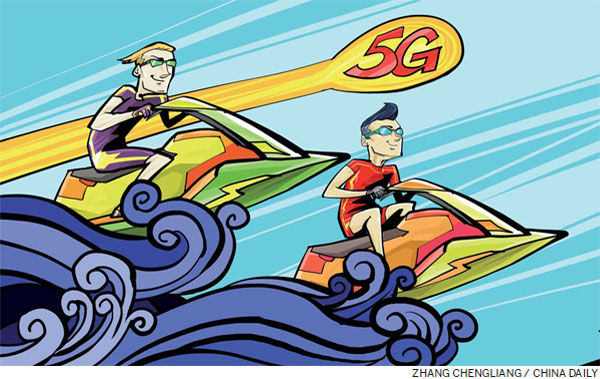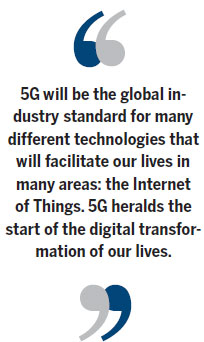For China, EU and world, 5G is future
Updated: 2015-09-25 08:00
By Luigi Gambardella(China Daily Europe)
|
|||||||||||
European commissioner's visit to Beijing provides perfect opportunity for talks on more collaboration
The first visit of Gunther Oettinger, as European Commissioner for Digital Economy and Society, to Beijing on Sept 28 will be of the utmost importance.
China has become the leading manufacturer of digital equipment over the past decade. Today Chinese companies are exporting high-tech worldwide, generating billions of dollars in revenue and providing employment to thousands of Chinese workers, from factory workers to highly qualified IT specialists and microprocessor designers.

The European Union is a major export market for these companies. Staying in touch with the key European decision makers in this sector is thus critical for China, which aims to become a leading global innovator.
The main reason for Oettinger's visit is to take part in the EU-China High Level Economic and Trade Dialogue, but it will also provide him with the rare opportunity to discuss closer collaboration with China in a number of strategic areas, such as the next generation of mobile communications (5G), the successor of the currently deployed 4G and also known as LTE. 5G is about 1,000 times faster than 4G. The visit follows the China-EU Summit and earlier high-level meetings.
Lu Wei, director of the Cyberspace Administration of China, visited Brussels for the first time in July and met many European decision makers and business leaders. Europe is very prominent on the radar of Lu, who is well aware of the unique opportunities for collaboration with EU industry and research centers and of their potential contribution to the further growth of the Chinese Internet industry.
However, 5G is not fully defined yet. The aim is to provide seamless connectivity everywhere and all the time. It is not just an improvement of the current mobile technology, allowing faster smartphones and tablets. It is much more than that. 5G will be the global industry standard for many different technologies that will facilitate our lives in many areas: the Internet of Things. 5G heralds the start of the digital transformation of our lives. Potentially everything can be connected, for example, cars. Other vehicles and central traffic management centers will provide cars connected over 5G with real-time information. The connected cars will react autonomously to these data, for example braking in case of emergency.

Besides information from other sources, vehicles would have sensors, radar and roof-mounted lidars - which use lasers instead of radio waves - to be able to detect obstacles completely autonomously and to react to dangerous situations, faster than human beings can do. This will enable automated driving, that is cars without human drivers.
It is important to clarify how China will benefit from a closer collaboration with Europe on 5G.
5G not only means tremendous business opportunities for vendors, producing network equipment, for example, ZTE, which is already one of the major contributors to and participants in research on international 5G standards.
Companies producing high-tech equipment necessary to equip cars, trains, central heating and air-conditioning systems, fridges, elevators, etc will have tremendous opportunities to grow. China has the expertise and the manpower to be in the leading position to provide these new high-tech products and applications. But the industry needs visibility on the timing of the operational launch of 5G. Carmakers, fridge makers and others will buy their technologies and include them in their consumer products and appliances only when 5G is there.
That is where Oettinger and Lu play such a critical role. We urgently call the two sides to finalize a strategic collaboration on 5G as soon as possible, followed by an agreement on big data and on collaboration between Industry 4.0 and Internet Plus.
There are three priority areas that call for action. First, spectrum. 5G will require a blend in various spectrum bands, from sub 1 gigahertz spectrum all the way up to the 40 and even 80 GHz bands. If connected cars use other frequencies in Europe and China, this will reduce economies of scale for the production of the required equipment and complicate exports.
Second, timing. Oettinger and the Juncker commission of the EU are advancing efforts to ensure a timely development of global standards and a spectrum management concept for 5G. China should support this move, to unlock the tremendous business opportunities of the Internet of Things.
Third, standards. Industry needs a clear view of which standards will be used for which applications. Only global standards will ensure full interoperability of connected devices and communications networks. China and the EU could leverage their unique technological and market strengths collaboratively to establish a major strategic presence in future 5G mobile markets globally.

The industry's awareness of these possibilities has to be raised. In Europe, key vendors and manufacturers, including leading Chinese companies present in Europe, have entered into a public-private partnership with the EU, the 5G public-private partnership. The EU is funding research and pilot projects allowing testing of new applications in fields as diverse as smart cities, smart energy, urban traffic, manufacturing and healthcare. In China, a leading member of the ChinaEU association, ZTE, was the first to propose the pre-5G concept, which caused a sensation in the industry. Last November ZTE and China Mobile completed testing the world's first pre-5G massive MIMO base station. Pre-5G adopts the most practical core 5G technology, provides a user access experience close to that of 5G and is compatible with LTE terminals already in the market.
What the industry is waiting for, to pass to the next production stage, is visibility on the calendar of the deployment of 5G, the identification of the applications that will be launched first and, as mentioned, global standards for 5G. This is why it is so important for China and the EU to work together in 5G research.
The road to 5G may be long and contain hurdles and a detour or two. For example, access to new applications could be prevented, delayed or made more expensive as a consequence of patent wars, like those that we saw with 3G. A joint political initiative from China and the EU would be useful in clarifying the application of intellectual property rules in this domain characterized by fast innovation, whereby new applications will necessarily build on the strengths of existing elements, on which competitors may hold patents.
The author is president of ChinaEU, a business-led association that aims to strengthen joint research and business collaboration and investment in Internet, telecommunications and high-tech between China and Europe. The views do not necessarily reflect those of China Daily.
(China Daily European Weekly 09/25/2015 page12)
Today's Top News
Hundreds killed in Saudi Hajj stampede
Volkswagen to pick Porsche boss as new CEO
EU leaders claim unity regained, pledge aid for Syrians
Business leaders, experts applaud Xi's speech in Seattle
Premier encourages innovation
Xi calls for safe cyberspace, reassures US business titans
Volkswagen CEO quits after carmaker rocked by diesel scandal
EU pushes through plan to relocate 120,000 refugees
Hot Topics
Lunar probe , China growth forecasts, Emission rules get tougher, China seen through 'colored lens', International board,
Editor's Picks

|

|

|

|

|

|






